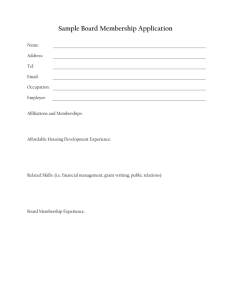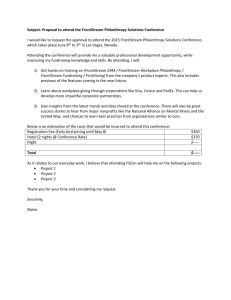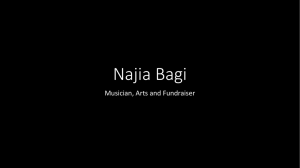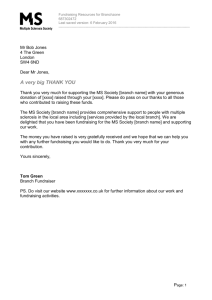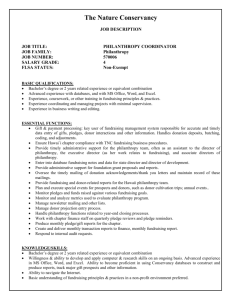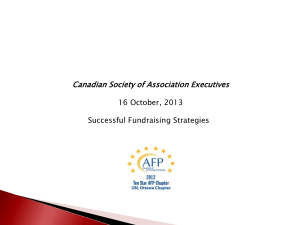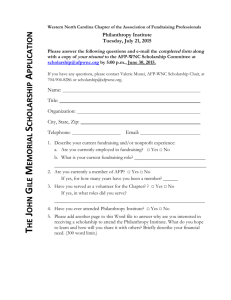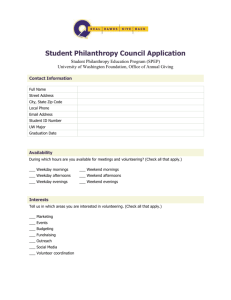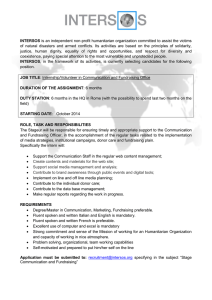Heller Graduate School
advertisement
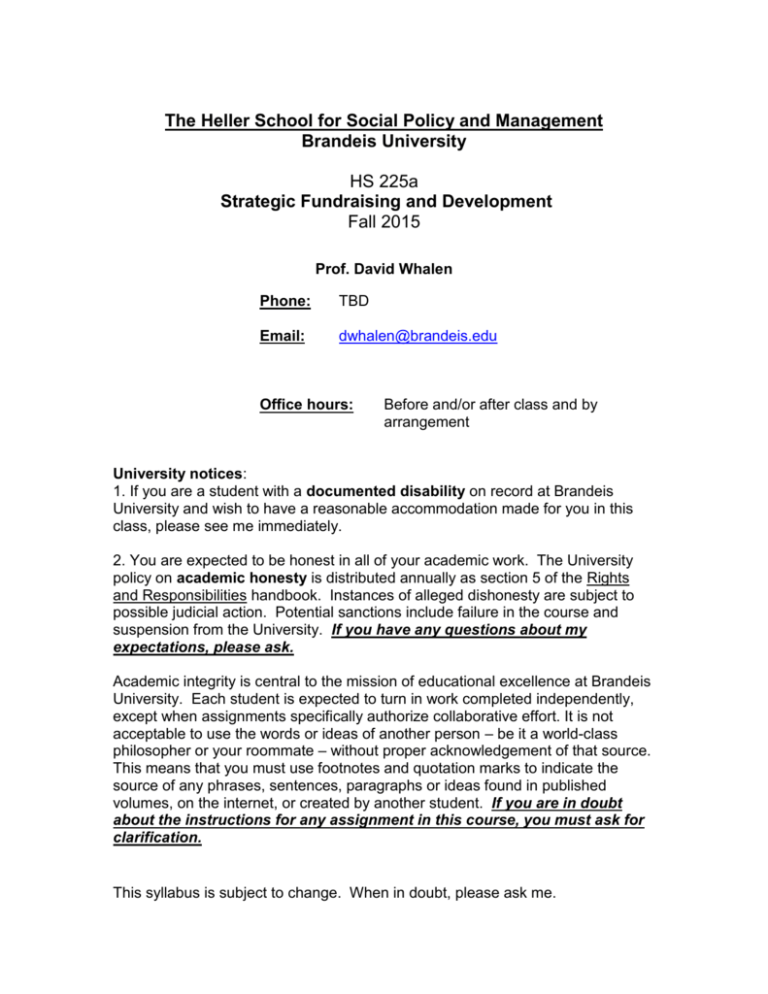
The Heller School for Social Policy and Management Brandeis University HS 225a Strategic Fundraising and Development Fall 2015 Prof. David Whalen Phone: TBD Email: dwhalen@brandeis.edu Office hours: Before and/or after class and by arrangement University notices: 1. If you are a student with a documented disability on record at Brandeis University and wish to have a reasonable accommodation made for you in this class, please see me immediately. 2. You are expected to be honest in all of your academic work. The University policy on academic honesty is distributed annually as section 5 of the Rights and Responsibilities handbook. Instances of alleged dishonesty are subject to possible judicial action. Potential sanctions include failure in the course and suspension from the University. If you have any questions about my expectations, please ask. Academic integrity is central to the mission of educational excellence at Brandeis University. Each student is expected to turn in work completed independently, except when assignments specifically authorize collaborative effort. It is not acceptable to use the words or ideas of another person – be it a world-class philosopher or your roommate – without proper acknowledgement of that source. This means that you must use footnotes and quotation marks to indicate the source of any phrases, sentences, paragraphs or ideas found in published volumes, on the internet, or created by another student. If you are in doubt about the instructions for any assignment in this course, you must ask for clarification. This syllabus is subject to change. When in doubt, please ask me. 2 MBA Program Leaning Goal Integrative Skills: Students will be able to integrate tools, frameworks, and evidence from multiple disciplines in order to innovate and solve management problems. Course Overview: Strategic Fundraising and Development This course will provide students with a basic grounding in key concepts of private fundraising and development. It will explore the role of private philanthropy in the management of non-governmental organizations, specifically the relationships between philanthropy and ethics; management decision making and the role of a “gift economy”; the role of leaders and boards in fundraising as well as options for structuring an integrated development plan. In addition to the theoretical framework for understanding how strategic fundraising and development practices are incorporated with NGO management, this course will offer students practical hands on experience with foundation research, grants writing, and the creation of several key components of a comprehensive fundraising plan. Core competencies include: internet and library research skills, quantitative analysis focusing on cost-benefit ratios, persuasive writing skills, qualitative analysis of management cases, presentation and public speaking skills and the development and management of strategic planning initiatives. Course Requirements 1. Attendance at all sessions; prompt arrival. 2. Preparation of all readings. 3. Timely submission/presentation of assignments. 4. Helpfulness to and respect for other students. 5. Other including: Class participation: As a community of learners, we learn best when we actively question what we have learned, challenge and support each other’s ideas, and help to draw connections between the material we are covering in class and our experiences in other courses and professional settings. Given this, active participation in class discussions, including evidence of having done the prescribed readings, will be expected. If you are unable to attend class, you are expected to call me before the missed class session. Unexcused and/or more than one absence from class will result in a reduction in the class participation portion of the final grade. Case analyses: Students will prepare a 3-page analysis for two of the ten cases we will read this semester. Students may choose which cases they write up. The cases that are appropriate for analysis are 2/12/2016 final 3 noted in the list of class readings. Additional details about the case analysis assignments will be discussed during the first class session. At least one of the case analyses must be completed and turned in by October 12, 2015. Fundraising Portfolio: Students will be asked to choose an NGO that they will use to develop the following portfolio: Funding research report Letter proposal Donor appeal letter Each element of the fundraising portfolio should be 2-4 pages long, as appropriate. Assignment instructions are on LATTE and additional details will be provided in advance of each portfolio assignment. Final Project: The final project will include both a 12-15 page final report and a 10-15 minute professional presentation to the class. Students will work in groups of two to four (depending on class size) and will choose a non-profit (it must be different from that used for the portfolio) and prepare one of the following: 1. A private foundation proposal 2. An annual fundraising plan 3. A corporate sponsorship proposal 4. A research paper on a relevant topic in philanthropy 5. A fundraising-related project of the student’s choosing (w/instructor’s permission). ** Additional details about each final project type can be found on LATTE. Your grade will be calculated as follows The grade for the course will be determined by: Class participation: 25% 2 case analyses: 20% Fundraising portfolio 35% Final project and presentation: 20% Policy for late papers or missed exams Arrangements for make up papers must be made before the paper is due. Readings: 2/12/2016 final 4 Guide to Proposal Writing, 6th edition The Foundation Center, NYC 2012 (Purchase directly Amazon) What’s Love Got to Do with It? A Critical Look at American Charity, David Wagner, The New Press, NYC 2000 Chapter 4 "The September 11th Fund: The Creation" Harvard Business School Jane WeiSkillern; March 26, 2002 “An Inspired Model…or a Misguided One?”, Harvard Kennedy School 2010 “Dana Farber Cancer Institute: Development Strategy”, Harvard Business School June 2000 V. Kasturi Rangan and M. Bell *** “Finding Your Funding Model”, Stanford Social Innovation Review, Fall 2011 “Philanthropy’s New Agenda: Creating Value”, Harvard Business Review November 1, 1999 Michael Porter and Mark Kramer “Peninsula Community Foundation”, Harvard Business School, December 2004, J. Austin, J. Wei-Skillern and A. Berkley Wagonfeld *** “The Robin Hood Foundation”, Harvard Business School, January 5, 2012; A. Ebrahim and C. Ross*** “Cause Related Marketing: 3M as a Corporate Sponsor of the Canadian Breast Cancer Foundation, Ivey School of Business, The University of Western Ontario, 2011*** “The Hidden Costs of Cause Marketing” , Stanford Social Innovation Review, Summer 2009; A. Eikenberry “Maitri AIDS Hospice”, Stanford University, August 2001, J. Gregory Dees and Beth Anderson *** "Pallotta TeamWorks" Harvard Business School, Allen Grossman and Liz Kind; April 2, 2002 *** “The Rise of Social Capital Market Intermediaries”, Stanford Social Innovation Review”, Winter 2012 Fundraising letters (5) “The Permanent Disruption of Social Media”, Stanford Social Innovation Review, Winter 2013 2/12/2016 final 5 “The Power of Brands”, Stanford Social Innovation Review, Winter 2007 “Canadian Cancer Society: Fundraising Controversy”, Ivey School of Business, The University of Western Ontario, 2011 -When You’ve Made Enough to Make a Difference”, Harvard Business Review, January/February 2011; W. Foster and S. Wolf Ditkoff “Who Brought Bernadine Healy Down?” Susan Sontag, The New York Times, December 23, 2001 “Venture Philanthropy: Its Evolution and Its Future”, Harvard Business School, June 13, 2014 “Acumen Fund and WaterHealth International: The Role of Venture Philanthropy”, Graduate School of Business, Stanford University, April 2007*** “The Amy Biehl Foundation Trust” (South Africa) Graduate School of Business, Stanford University October 2000 *** ”One Acre Fund: Outgrowing The Board”, Kellogg School of Management, Northwestern University, 2010*** “Google.org: For Profit Philanthropy”, Harvard Kennedy School, March 2012*** “Board Passages: Three Key Stages in a Non-Profit Board’s Life Cycle”, Karl Mathaisen III , National Center for Non-Profit Boards 1999 *** Case appropriate for analysis (see assignments) On occasion, supplemental reading materials may be distributed by the instructor for discussion in a subsequent class. If you are absent, it is your responsibility to obtain these reading materials prior to the next scheduled class. CLASS SESSIONS August 31: Class 1 Introductions Learning Objectives 2/12/2016 final 6 Overview of course American Philanthropy: Who gives what to whom…and how much? Current trends and issues in philanthropy September 10: Class 2 (THURSDAY) Role of philanthropy in the not for profit sector and society Philanthropy in a political and cultural context An introduction to an ethical framework for development and fundraising Analyzing business cases Reading: -Wagner, Chapter 4, pp. 88-115 -"The September 11th Fund: The Creation" Harvard Business School Jane Wei-Skillern; March 26, 2002 -“An Inspired Model…or a Misguided One?”, Harvard Kennedy School 2010 September 21: Class 3 Basic building blocks of a Development Plan Choosing funding models: strategy and practice Introduction to fundraising research Reading: -“Dana Farber Cancer Institute: Development Strategy”, Harvard Business School June 2000 V. Kasturi Rangan and M. Bell -“Finding Your Funding Model”, Stanford Social Innovation Review, Fall 2011 Written Assignment: Case analysis (if chosen) Turn in the name of the not for profit organization chosen for the fundraising portfolio September 29 Class 4 (TUESDAY) Foundations: Private, Corporate and Community Private sector proposal writing Public sector proposal writing Reading: 2/12/2016 final - “Philanthropy’s New Agenda: Creating Value”, Harvard Business Review November 1, 1999 , Michael Porter and Mark Kramer 7 -“Peninsula Community Foundation”, Harvard Business School, December 2004, J. Austin, J. Wei-Skillern and A. Berkley Wagonfeld October 12: Class 5 The mechanics of proposal writing Final Project overview and planning Reading: -Guide to Proposal Writing, Chapters 1-7 -“The Robin Hood Foundation”, Harvard Business School, January 5, 2012; A. Ebrahim and C. Ross Written Assignments: Case analysis (MUST TURN IN FIRST ANALYSIS) Fundraising Portfolio: Funding research assignment October 19: Class 6 Proposal writing (con’t) Corporate philanthropy Cause-related marketing Reading: -Guide to Proposal Writing, Chapters 8-13 -“Cause Related Marketing: 3M as a Corporate Sponsor of the Canadian Breast Cancer Foundation, Ivey School of Business, The University of Western Ontario, 2011 -“The Hidden Costs of Cause Marketing”, Stanford Social Innovation Review, Summer 2009; A. Eikenberry Written Assignments: Final project team and topic submitted October 26: Class 7 Events Fundraising Social Media and Fundraising Rating Nonprofit Organizations Mid-course evaluation Reading: 2/12/2016 final - “Maitri AIDS Hospice”, Stanford University, August 2001 J. Gregory Dees and Beth Anderson -"Pallotta TeamWorks", Harvard Business School, April 2002 8 -“The Rise of Social Capital Market Intermediaries”, Stanford Social Innovation Review”, Winter 2012 Written Assignments: Case Analysis (if chosen) November 2: Class 8 Branding and NGOs Direct Marketing/Direct Mail Digital Fundraising and Social Media Reading: -“The Power of Brands”, Stanford Social Innovation Review Winter 2007 -“The Permanent Disruption of Social Media”, Stanford Social Innovation Review, Winter 2013 -Fundraising letters (5) Written Assignments: Fundraising Portfolio: Letter proposal November 9: Class 9 Major Gifts fundraising and “The Ask” Managing fundraising crises Readings: -When You’ve Made Enough to Make a Difference”, Harvard Business Review, January/February 2011; W. Foster and S. Wolf Ditkoff -“Who Brought Bernadine Healy Down?” (The Red Cross’ response to September 11) Susan Sontag, The New York Times, December 23, 2001 -“Canadian Cancer Society: Fundraising Controversy”, Ivey School of Business, The University of Western Ontario, 2011 Written Assignments: None November 16: Class 10 Venture Philanthropy and Social Enterprise Cultural diversity and philanthropy 2/12/2016 final 9 Readings - “Acumen Fund and WaterHealth International: The Role of Venture Philanthropy”, Graduate School of Business, Stanford University, April 2007*** - “Venture Philanthropy: Its Evolution and Its Future”, Harvard Business School, June 13, 2014 -“The Amy Biehl Foundation Trust” (South Africa) Graduate School of Business, Stanford University October 2000 *** Written Assignments: Case analysis (if chosen) Fundraising Portfolio: Donor Appeal letter November 23: Class 11 Board Governance and Fundraising Emerging Philanthropic Models Reading -“Board Passages: Three Key Stages in a Non-Profit Board’s Life Cycle”, Karl Mathaisen III 1999 -”One Acre Fund: Outgrowing The Board”, Kellogg School of Management, Northwestern University, 2010 -“Google.org: For Profit Philanthropy”, Harvard Kennedy School, March 2012 Written Assignments: None November 30: Class 12 Selected fundraising topics (as possible) FINAL PRESENTATIONS Reading: To be announced Written Assignments: Final Projects (all written projects due tonight regardless of when your presentation is scheduled) December 7: Class 13 FINAL PRESENTATIONS 2/12/2016 final
